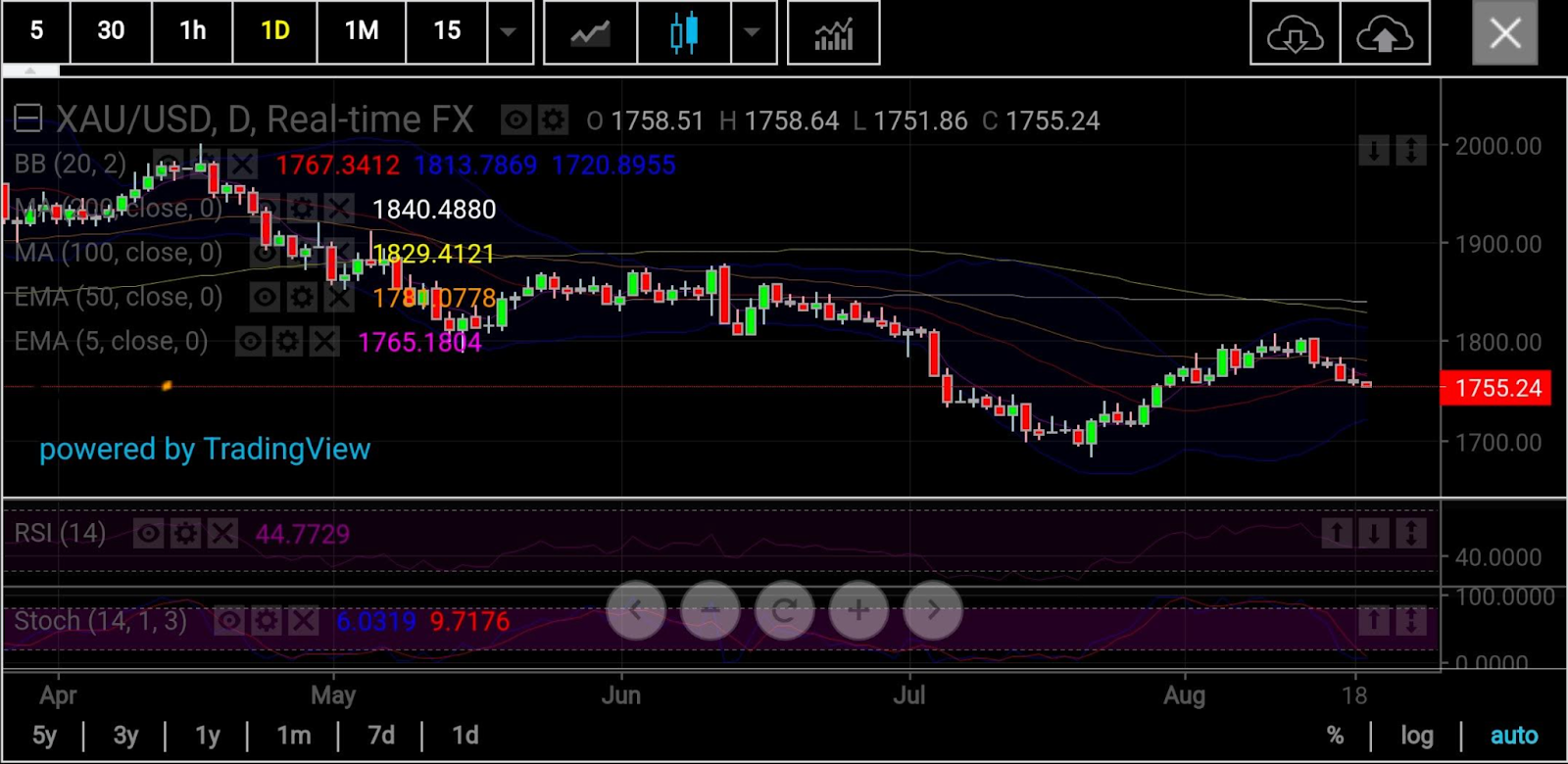- Gold rally pauses with week of loss in five
- No major breakdown yet; current $1,755-$1,765 level seen dipping to $1,730
- Fed bankers’ call for 75-basis point hike in September could be a problem though
The gold 'rally'—if it can be called that—seems to have paused as mixed data raises questions on whether the fledgling U.S. recession will deepen or the dollar will pick up steam again as the Federal Reserve weighs more outsized rate hikes.
Until last week, a four-week run-up had given both gold futures on New York’s COMEX as well as the spot price of bullion a gain of about $120 or 7% from July 21 lows of around $1,680. The yellow metal peaked at almost $1,825 on August 10.

All charts by SKCharting.com with data powered by Investing.com
This came against the backdrop of softening inflation and other data which signaled that the Fed might be done with super-sized rate hikes, a notion that pressured the dollar lower.
Since the start of this week though, the tide has turned, with U.S. weekly jobs numbers and manufacturing and other data coming in stronger. The dollar, gold’s contra trade, subsequently began creeping up.
Gold, as a result, weakened and is poised to post its first weekly loss in five.
At the time of writing, both futures and bullion were down more than 2.5% for the week ending August 19, conceding nearly a third of what they had gained over the past month.
The yellow metal was also hovering well below the key $1,800-an-ounce level, with futures holding just above $1,765 and spot a little under $1,755.
The Dollar Index, which pits the U.S. currency against the euro and five other majors, was up almost 2% on the week, a point not missed by analysts such as Ed Moya of online trading platform OANDA. He explained:
“Gold is locked up in battle with king dollar. The U.S. dollar might continue to strengthen if US economic data continues to surpass expectations.
“After breaking below $1,800, gold has been struggling to regain its footing. Aggressive rate hikes globally, from the Philippines and Norway [besides the U.S.], are keeping the pressure from non-interest bearing gold.”
The grind lower has started for gold. The question is how much lower it could get.
Surprisingly, both chart signals and views of fundamentals analysts indicate that it will not be very much lower.
This is because of the inflation dynamic that’s tied to the stronger U.S. data that has been emerging over the past week. All said and done, gold remains as a hedge against inflation for some of the most serious investors, although it has not been able to really live up to that billing since hitting record highs of above $2,100 in August 2020.
Thus, even chartists such as Sunil Kumar Dixit, chief technical strategist at SKCharting.com, think gold will go to around $1,730 at most in this first round of weakness, with further breakdown below $1,700 coming only if the dollar goes rampant.
Said Dixit:
“Rejection/selling pressure from resistance areas of $1777-$1781 may push gold lower towards $1,744 and $1,729, which are 50% and 61.8% Fibonacci levels of retracement from $1,681 to $1,808.”
On the flip side, a rebound could happen as well if the yellow metal is deemed oversold, he said, adding:
“In some aspects, gold has reached oversold areas and is likely to show a short term rebound as stochastic readings of 13/9 on the 4-Hour chart make a positive overlap.”
“We can see prices retesting the broken support turned resistance areas of $1,768 - $1,777 and the 50-Day Exponential Moving Average of $1781.”
Justin McQueen, who blogs on the direction for gold at DailyFX, has a somewhat similar call:
“$1,760 has been a key level for short-term direction and the fact that gold has held this level, keeps markets looking to the topside. That being said, should we see a break and close below $1760, the immediate focus would be on $1720-25 for bears.”
Moya of OANDA said gold appears to be forming a trading range between $1750 and $1800, with investors refraining from taking massive positions until markets cross the Jackson Hole Symposium week—the annual Fed brainstorming fest on the economy that takes place this year between August 25 and 27. He added:
“Jackson Hole might not trigger any major surprises as the Fed seems locked into their data-dependency mode.”
The Fed has raised interest rates four times since March, bringing them to a peak of 2.5% from a high of just 0.25% in February. The central bank says it expects to continue with rate hikes until inflation returns to its target of 2% per year.
Inflation, as measured by the Consumer Price Index, grew by 8.5% during the year to July after expanding at a four-decade high of 9.1% in the 12 months to June.
The problem for the Fed, however, is that the economy has also slowed since the start of this year, with gross domestic product (GDP) registering a negative 1.6% in the first quarter and a preliminary 0.9% negative reading for the second quarter.
Conventionally, two straight quarters of negative GDP growth mean a recession. But both the Fed and the White House have tried hard to dispel the notion of an economy tanking when the job market keeps rocketing month after month.
Unemployment among Americans reached a record high of 14.7% in April 2020, with the loss of some 20 million jobs after the COVID-19 breakout. Since then, hundreds of thousands of jobs have been added every month. The trend did not let up in July, with some 528,000 positions added—more than twice the level forecast—despite the economy technically being in a recession after two straight quarters of negative gross domestic product.
For the Fed’s upcoming September 21 rate hike, money market traders are betting on a 50 basis point hike, versus previous wagers for a 75 basis point increase.
But some Fed bankers, like James Bullard who heads the St. Louis division of the central bank, think a 75 basis point hike is necessary to keep up the fight against inflation.
Such talk will give more ammo to the dollar, busting gold.
Disclaimer: Barani Krishnan uses a range of views outside his own to bring diversity to his analysis of any market. For neutrality, he sometimes presents contrarian views and market variables. He does not hold positions in the commodities and securities he writes about.
